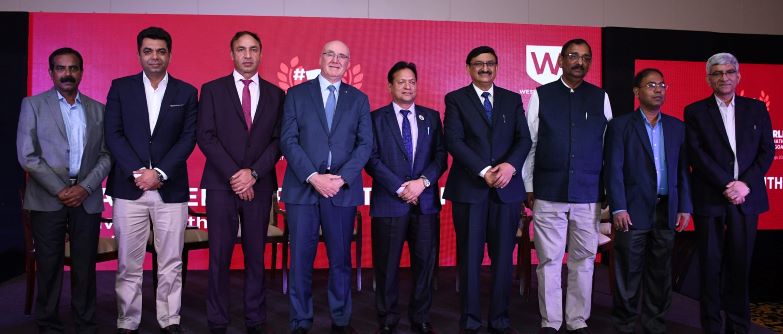
Australia’s highly ranked Western Sydney University (ranked #1 in social, ecological and economic impact by THE) on Nov 22 signed entered into agreements with seven State Agriculture Universities in India as part of a cohort headed by the Indian Council for Agricultural Research (ICAR)- the largest network of agricultural research and education institutes in the world. The cohort works in agricultural education, research and extension system.
The Agreements were signed in New Delhi at Western Sydney University’s SDG Forum, themed “Partnership with impact – advancing the SDGs” with thought leaders such as Dr. Pankaj Mittal, Secretary General, Association of Indian Universities; Dr. Sharad K Jain, Former Director, National Institute of Hydrology, Roorkee; Mr Anuj Agarwal, Chief Operating Officer, ICICI Foundation, Ms Srivalli Krishnan, Senior Program Officer – Global Development, Bill and Melinda Gates Foundation and Hon Karlene Maywald, South Australian Water Ambassador speaking about how they address SDGs in their organizations.
“We now have 23 partnership agreements between State and Central Agricultural Universities and Western Sydney University which enables research and capacity-building at scale. In addition to Dual Masters and PhDs with scholarships, the partnerships are leading research in climate smart farming systems in India and Australia,” said Dr. Rakesh Chandra Agrawal, Deputy Director General (Agricultural Education), Indian Council of Agricultural Research (ICAR).
“This marks an important expansion of our AUD15 million scholarship commitment to Indian State and Central Agricultural Universities and other partners. 50 PhD scholarships will help to scale up climate smart agriculture research to boost yields for farmers and strengthen food security in India,” said Professor Barney Glover AO, Vice-Chancellor and President at Western Sydney University.
Panelists at the SDG Forum discussed the role of higher education partnerships and collaborations with corporate, government, education and NGO organisations, in addressing the 17 SDGs that aim to end global poverty, zero hunger, responsible consumption and production, water use efficiency, improve access to health and education and build strong institutions and partnerships by 2030. The panel also featured research, education and training partnerships in water and food security which are making a difference to communities. Sarah Storey, Australia’s Deputy High Commissioner to India, opened the SDG Forum. “These smart agriculture partnerships and scholarships are an important demonstration of the deepening links between India and Australia”, she said.
Keynote speaker Professor Glover highlighted that Western Sydney University was one of the earliest universities to become a signatory to support the SDGs and is deeply committed to expanding partnerships in India that advance sustainability. “Western Sydney University is committed to addressing the challenges of our time, and together with our international partners, including India, we can make a difference to the complex problems facing the planet by bringing together our best researchers and educators to develop the solutions that are needed for future generations,” he said.
The Western Sydney University has set bold targets for its campus operations to have 100 per cent renewable energy by 2025 and to achieve carbon neutrality by 2023. It also has numerous world-class research projects, facilities and initiatives advancing the work of the SDGs, including its globally-recognised, innovative approach to education through the 21C Curriculum Project. This will ensure all graduates have the opportunity to develop the capabilities to lead within their professions and society to meet the challenges of the SDGs.










